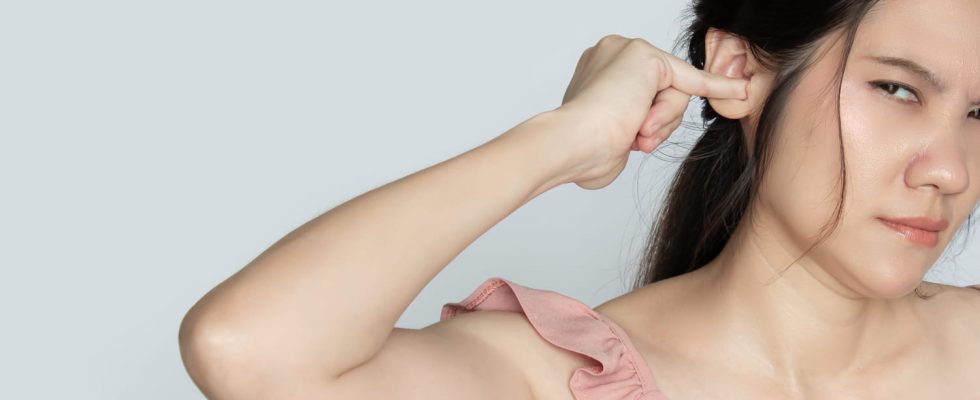Itchy ears can have various causes, from simple irritation to infection (otitis, cold), with or without pain. Tour of the causes of an itchy ear, day, night, on one side…
Itching (or pruritus) in one or both ears can be unpleasant. However, this symptom is not always the sign of a serious infection but most often ofsimple irritation or skin disease. Why is it itchy in the ear? How to cure an itchy ear?
What are the causes of an itchy ear?
► Otitis and infections: otitis are ear infections, common in children and in people who swim in a pool or the sea. Acute or chronic, otitis is the cause of pain, a feeling of blocked ear , redness and itching. In the case of swimmer’s earthe infection is due to the persistent presence of humidity in the auditory canal: the water creates a favorable climate for the development of bacteria or microscopic fungi.
► Pharyngitis or angina: certain infections such as pharyngitis or angina can also cause the ears to feel itchy, in addition to fever and pain in the throat.
► Irritations: Ear irritations are usually mild, but they can cause itching inside the ear canal and a feeling of discomfort. The causes of ear irritation are diverse: hormonal fluctuations, dryness of the ear canalpresence of soap or shampoo in the ear, excessive cleaning (especially with a cotton swab), wearing hearing aids or earplugs.
► Eczema or psoriasis: like other parts of the body, the skin of the ear is potentially subject to conditions such as eczema or psoriasis. In addition to itching, these result in rashes. Atopic eczema or infant eczema is common in children and can occur in the ears.
► allergies (to pollen, food, dust mites): Seasonal allergies (pollen allergy), food allergies and dust mite allergies are likely to cause itching inside the ears.
What does itchy ears at night mean?
Itchy ears at night may suggest certain allergies.
What are the risk factors?
Known allergies and wearing hearing aids or earplugs (silicone, foam, or wax) can be a risk factor for itching. In case of psoriasis or eczema on another part of the body, it is also necessary to look for an attack of the ears.
When to consult?
It is advisable to make an appointment with the attending physician and/or ENT if the itchy ear does not improve with time or home care.
Cleaning your ears properly does not mean completely getting rid of earwax, which is useful for lubricating the ear canal and protecting it from impurities, but only the surplus. It must be removed once a week only with a paper handkerchief and the little finger, by a movement from the inside outwards and being limited to the auricle and the entrance of the duct. It’s better to to do without sticks, candles, spraying water or oily solutions that can cause irritation and/or maceration at the bottom of the duct, which in some cases leads to infection. The process is the same in children and adults.
In case of persistent itching in the earsit is recommended see a doctor to receive treatment appropriate to the cause, especially if the symptoms are accompanied by fever and discharge. The prescription of antibiotics may be necessary if the itching is due to an ear infection. To treat irritation, it is possible to use drops or an oil-based solution, after consulting his doctor. In the case of an allergy, itching in the ears can be relieved with antihistamines or corticosteroids. Desensitization is also possible.
- Avoid scratching and cleaning your ears with a cotton swab at the risk of further irritating the ear canal.
- People who bathe are advised to carefully dry their ears after any exposure to humidity, and even to systematically protect them.
- Be careful with potentially irritating toiletries.
